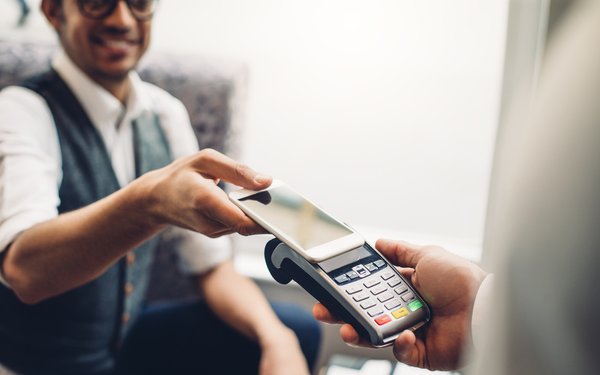
Despite the ongoing tradition of buying in stores,
consumers put more trust in mobile and online shopping, from a security standpoint.
While mobile wallet adoption in the United States has not reached mass scale, almost all consumers using
them feel they are at least somewhat secure, based on a new study.
The study, conducted by ACI Worldwide, comprised a survey of 6,000 consumers in 20 countries in the Americas, EMEA and the
Asia-Pacific region. Almost all the consumers surveyed had one or more type of payment card.
Although it differs by market, consumers of bank-based mobile wallets generally have a high degree
of confidence in the security of the mobile payments, with 80% at least somewhat comfortable with mobile wallet security.
In the U.S., there’s a higher degree of confidence. For mobile
wallets, almost all (94%) consumers think the information stored on their smartphone or tablet is at least somewhat secure, with 30% totally trusting their bank to protect their personal information.
Only 6% of U.S. consumers say their mobile wallet data is not secure.
advertisement
advertisement
For online shopping, a large majority (81%) of U.S. consumers say that most sites where they shop use security systems
that are able to protect their account information.
For in-store shopping, not all consumers trust their data with retailers. In the U.S., 66% think most of the stores where they shop in
person use security systems that are able to protect their card/account information. However, nearly a third (32%) of consumers don’t trust the stores to protect their data.
Interestingly, U.S. consumers are somewhat forgiving of retailers where they have an issue. While more than a third (37%) of those who experienced fraud or were involved on a data breech with the
organization would stop shopping there, 26% would not and 37% are not sure.
Consumers in other markets are far less forgiving. Here’s the breakdown based on how many consumers would stop
shopping with a retailer if they experienced fraud or a data breach:
- 86% -- Brazil
- 84% -- Mexico
- 72% -- Spain
- 70% -- South Africa
- 70% --
Sweden
- 67% -- Italy
- 65% -- UAE
- 62% -- France
- 56% -- United Kingdom
- 54% -- Canada
- 53% -- Netherlands
- 52% -- Germany
- 37%
-- United States
The U.S. is at the very bottom of the list.
For feeling totally or at least somewhat secure, with the realization that the technology involved is still being
explored but is worth using for convenience, consumers in the U.S. are near the top of the list. Here’s the breakdown by country of how many think the information on their phone or wallet is at
least somewhat secure:
- 95% -- Brazil
- 94% -- United States
- 93% -- Mexico
- 89% -- Spain
- 85% -- France
- 84% -- Canada
- 78% -- The
Netherlands
- 78% -- Italy
- 74% -- Germany
However, of consumers who feel the information on their phone or tablet is totally secure, U.S. consumers are near the
bottom of that list. Here’s a breakdown by country of how many think the information on their phone is secure and they trust the bank to protect their personal information:
- 44% --
Canada
- 42% -- Mexico
- 40% -- France
- 38% -- Germany
- 34% -- Brazil
- 31% -- Spain
- 30% -- United States
- 28% -- The Netherlands
- 16% -- Italy
Part of the challenge is deploying totally secure technology for mobile and online shopping. The other part is gaining the confidence of consumers that their
information will remain secure.